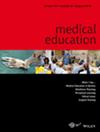Pedagogies of discomfort and disruption: A meta-narrative review of emotions and equity-related pedagogy
Abstract
Introduction
Discussions about equity in professional education can evoke a range of complex emotions. Approaches to emotionally challenging pedagogies may vary across professions. Comparative explorations of these approaches may yield fresh insights that could enhance our teaching and learning strategies within health professions education. Therefore, the authors sought to explore how the professional contexts of medicine, nursing and teacher education approach the role of emotions in equity-related pedagogy.
Methods
A meta-narrative approach was utilised to synthesise existing research on the relationship between emotions and equity-related pedagogy in three different professions. Six databases were searched using key terms yielding 3102 titles. After screening, 58 articles were selected for extraction. Through coding and analysis, the authors sought to gain a deeper understanding of why emotions are relevant to equity-related pedagogy in each profession, and how each profession grapples with emotional dissonance.
Results
There were both contrasting and complimentary meta-narratives about emotions and equity-related learning in medicine, nursing and teacher education. All three professions viewed emotions as relevant and essential for equity-related learning. Medicine and nursing sought to make emotions accessible and explicit, while foregrounding the need for learners to build skills to understand and address emotions such as critical reflection and dialogue. Meta-narratives in teacher education were similar to medicine and nursing; however, teacher education further emphasised the role of emotions in fostering community, trust and empathy.
Discussion
Existing meta-narratives regarding emotions and equity-related pedagogy in health professions suggest that medicine and nursing have acknowledged the intrinsic role that emotions play in equity-related learning yet lag behind teacher education in considering the role of emotions as a socio-cultural connector and mediator.

 求助内容:
求助内容: 应助结果提醒方式:
应助结果提醒方式:


